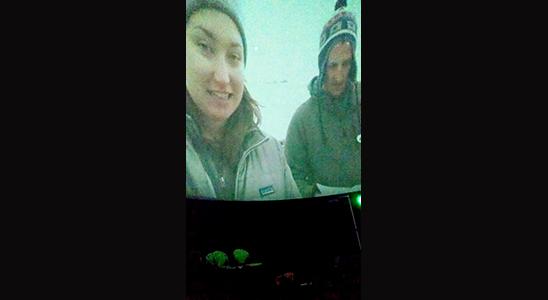UK entomologists share Antarctica with Lexington
UK entomologists share Antarctica with Lexington

University of Kentucky entomologists in Antarctica recently shared a research update and answered questions from young Lexingtonians as part of the Living Arts and Science Center’s No School Day program.
Nick Teets, UK assistant professor, and Leslie Potts, UK doctoral student, are currently located at Palmer Station, a U.S. research facility in Antarctica. There, they are collecting data and studying the Antarctic midge, the only insect endemic to the continent and the largest terrestrial animal that spends its entire life there. They are doing so as part of a grant from the National Science Foundation.
In addition to studying the insect, Potts is tasked with community outreach initiatives related to the project. Having previously worked at the Living Arts and Sciences Center as an instructor, Potts already had a connection with the facility.
“Leslie and Nick approached me about being involved with our Science Explorers Program, but because the timing of their visit to Antarctica also coincided with our No School Day Program, we decided to do a Skype session with them while they were there,” said Debbie Harner, lead discovery educator for the Living Arts and Sciences Center.
During the morning, students, who ranged in age from elementary to middle school, learned about Potts and Teets’ research project. UK researchers also connected the students with another Antarctic researcher studying penguins. The students developed questions to ask the three researchers during the Skype session in the center’s planetarium.
“It was cool,” said Veronica Olson, a fourth-grader at Tates Creek Elementary School who attended the program.” I always thought it (Antarctica) would be different, and they kind of explained stuff for me.”
This is just the start of the entomologists’ partnership with the center. When they return to Kentucky in mid-February, they will begin participating in additional educational outreach efforts with the center including its Science Explorers program and a special President’s Day presentation.
“This is a good opportunity for us to talk to local children about our research project, show them a science-based career that maybe they hadn’t thought of before and bring a little bit of Antarctica to Lexington,” Potts said.
Entomology Events Research


